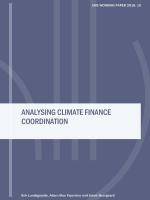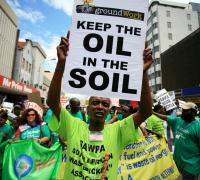Collaboration on climate funding
Finance to support climate change mitigation and adaptation comes from diverse sources. Coordination among the multiplicity of actors involved in finance provision and delivery has the potential to limit the duplication of efforts, lower administrative costs, and ensure that resource commitments reinforce one another to achieve greater impacts. Despite these possible advantages of coordination, collaboration among funders has limitations in practice.
In this working paper, Erik Lundsgaarde, Adam Moe Fejerskov, and Jakob Skovgaard identify factors that can be used to analyze coordination choices. The paper presents an overview of how coordination is conceptualized and explained in literatures dealing with global environmental governance, aid management, and organizational analysis. Although these literatures differ with respect to the levels of analysis they emphasize, the paper points to common threads in the explanations for coordination they propose.
The paper provides a foundation for further empirical work on the determinants of climate finance coordination.
DIIS Experts



